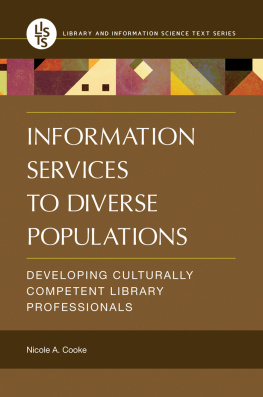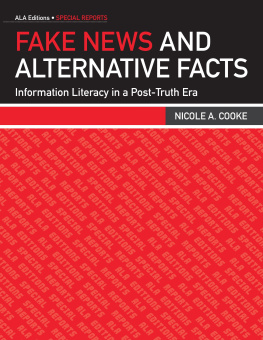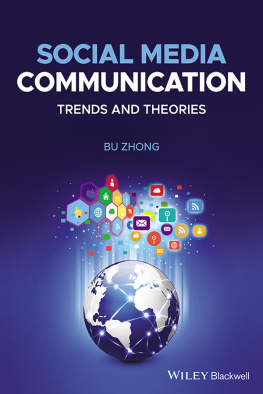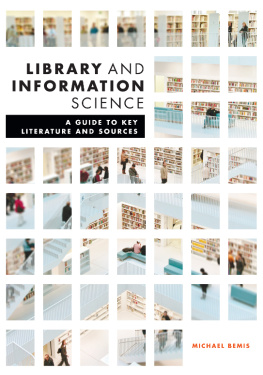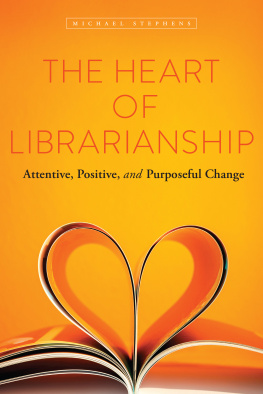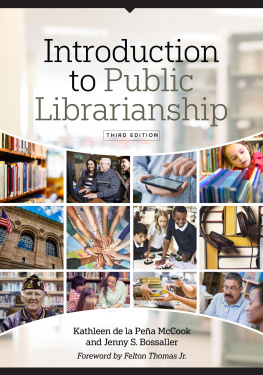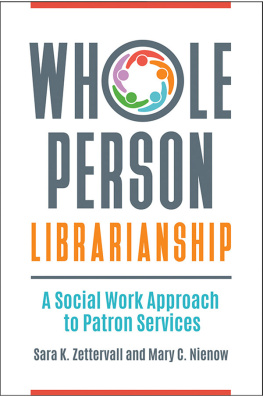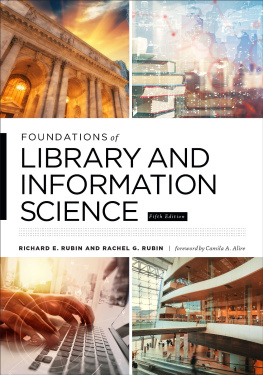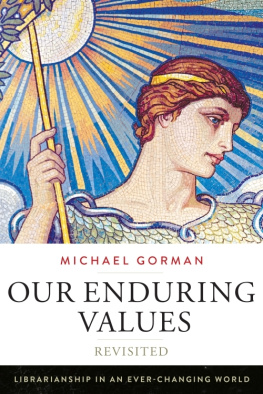Recent Titles in
Library and Information Science Text Series
The School Library Manager, Fifth Edition
Blanche Woolls, Ann C. Weeks, and Sharon Coatney
Young Adult Literature in Action: A Librarians Guide, Second Edition
Rosemary Chance
Childrens Literature in Action: An Educators Guide, Second Edition
Sylvia M. Vardell
Internet Technologies and Information Services, Second Edition
Joseph B. Miller
Library Programs and Services: The Fundamentals, Eighth Edition
G. Edward Evans, Margaret Zarnosky Saponaro, Carol Sinwell, and Holland Christie
The Complete Guide to Acquisitions Management, Second Edition
Frances C. Wilkinson, Linda K. Lewis, and Rebecca L. Lubas
Introduction to Cataloging and Classification, Eleventh Edition
Daniel N. Joudrey, Arlene G. Taylor, and David P. Miller
The Collection Program in Schools: Concepts and Practices, Sixth Edition
Marcia A. Mardis
Libraries in the Information Age: An Introduction and Career Exploration, Third Edition
Denise K. Fourie and Nancy E. Loe
Reference and Information Services: An Introduction, Fifth Edition
Linda C. Smith and Melissa A. Wong, Editors
Guide to the Library of Congress Classification, Sixth Edition
Lois Mai Chan, Sheila S. Intner, and Jean Weihs
Research Methods in Library and Information Science, Sixth Edition
Lynn Silipigni Connaway and Marie L. Radford
INFORMATION SERVICES TO
DIVERSE POPULATIONS
Developing Culturally Competent
Library Professionals
Nicole A. Cooke
Library and Information Science Text Series

Copyright 2017 by Nicole A. Cooke
All rights reserved. No part of this publication may be reproduced, stored in a retrieval system, or transmitted, in any form or by any means, electronic, mechanical, photocopying, recording, or otherwise, except for the inclusion of brief quotations in a review, without prior permission in writing from the publisher.
Library of Congress Cataloging-in-Publication Data
Names: Cooke, Nicole A., author.
Title: Information services to diverse populations : developing culturally competent library professionals / Nicole A. Cooke.
Description: Santa Barbara, California : Libraries Unlimited, an imprint of ABC-CLIO, LLC, [2017] | Series: Library and information science text series | Includes bibliographical references and index.
Identifiers: LCCN 2016031669 (print) | LCCN 2016045514 (ebook) | ISBN 9781440834608 (paperback : acid-free paper) | ISBN 9781440834615 (ebook)
Subjects: LCSH: Libraries and minorities. | Libraries and minoritiesUnited States. | Minorities in library scienceRecruiting. | Multicultural services librariansEmployment. | Libraries and society. | Libraries and community. | Cultural competence. | Diversity in the workplace. | Social justice. | Library schoolsCurricula.
Classification: LCC Z711.8 .C66 2017 (print) | LCC Z711.8 (ebook) | DDC 027.6dc23
LC record available at https://lccn.loc.gov/2016031669
ISBN: 9781440834608
EISBN: 9781440834615
21 20 19 18 17 1 2 3 4 5
This book is also available as an eBook.
Libraries Unlimited
An Imprint of ABC-CLIO, LLC
ABC-CLIO, LLC
130 Cremona Drive, P.O. Box 1911
Santa Barbara, California 93116-1911
www.abc-clio.com
This book is printed on acid-free paper 
Manufactured in the United States of America
As with anything I write or accomplish, I dedicate my work to my mother and grandmother who always demanded that I do better in life than they did. They are tough acts to follow, and I never take their love and support for granted.
Contents
Preface
While delivering a talk entitled Power, Privilege and Positionality: Applying a Critical Lens to LIS Education at the 2014 American Library Association (ALA) Annual Conference, an audience member asked me: Diversity is trendy again in libraries and library schools. How do we keep such an important topic from being trendy? My response to her was threefold:
I have been doing this work (working to diversify the field of librarianship) for over 15 years, as a library practitioner, and now as a library faculty member, and this work is not a trend for me, it is a commitment and a career. And we should be encouraging others to make similar commitments.
People need to write and present about diversity at professional conferences, often. We need to slam the conferences and ensure that issues of diversity and social justice are consistent themes and not just novelty or token topics.
We need to have regularly offered classes in diversity and social justice (particularly those taught by full-time faculty) in more than just a handful of ALA-accredited library programs.
This is how we can help ensure that more library and information science (LIS) professionals treat diversity as more than just a trend and actually make diversity a priority and a dedicated career path. In writing this text, I hope to contribute to the corpus and discussions the field continues to have about the how/why/what/when/where of diversifying the profession.
I have been fortunate to have the opportunities to teach dedicated courses on diversity, social justice, and race, gender, and sexuality in the information professions (in addition to infusing issues of diversity and cultural competence into other courses that I teach) (Cooke 2014a). In 2013, I developed and introduced a class at my institution (Information Services to Diverse Populations, the impetus for this text) because I did not see anything else like it in the curriculum, and I felt strongly that aspiring LIS professionals needed to be taught about cultural awareness, empathy, and community analysis techniques before graduating and immersing themselves in a diverse community. On-the-job training is valuable and essential to new professionals, but the LIS curricula around the country should be committed enough to regularly and consistently include diversity and related issues into their plan to produce quality and prepared information professionals, and they should want to stand behind one of the core tenets of the field (American Library Association 2004). It is my great belief that libraries should reflect the communities they serve, and that includes having librarians who belong to said communities. Patrons should be able to come to the library and see themselves in some way in the staff, the collections, and the programs. In order to do this, in part, LIS programs need to recruit and retain more students of color and students from a variety of diverse backgrounds. And part of that process is to have more LIS faculty of color and faculty from diverse backgrounds (Cooke 2014b). The Virtuous Circle Model, created by Jaeger and Hill (2007), describes this cycle in great detail; the process of effectively and compassionately serving diverse communities is multifaceted, dynamic, ongoing, and involves the professions at multiple levels.
The Information Services to Diverse Populations class, as you will see as you progress through the book, takes a broad look at diversity, not only encompassing racial and ethnic diversity, but also addressing other growing and equally deserving communities such as the blind and differently abled, the homeless, the mentally ill, lesbian, gay, bisexual, trans, and queer (LGBTQ) communities, and more. As part of my commitment to this area of the curriculum, I revised and institutionalized a previously dormant course,

